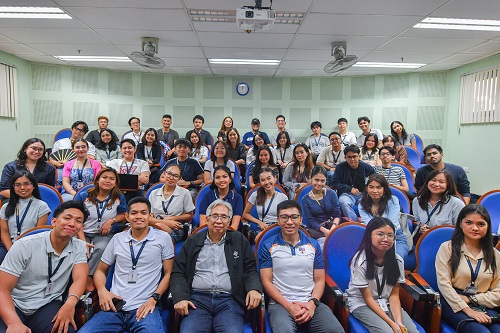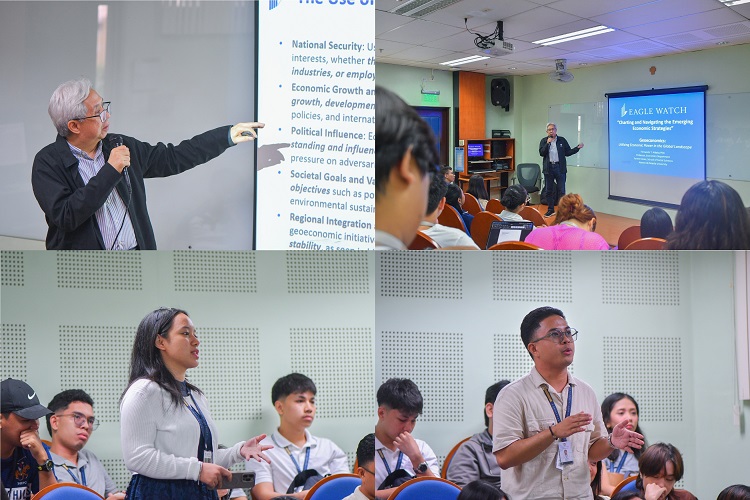By Jessica S Cahulogan

Photos by: Rroj Gavenia, Rafael La Victoria
The Department of Economics proudly hosted a thought-provoking Professorial Lecture on Geoeconomics on 2 April 2025, at AVR 7 of Xavier University – Ateneo de Cagayan. The event brought together students, faculty members, and guests from various disciplines for an engaging afternoon of learning. The lecture was delivered by Dr Fernando T Aldaba, a respected economist and former Dean of the School of Social Sciences at Ateneo de Manila University.
The event, titled “Charting and Navigating the Emerging Economic Strategies: Geoeconomics in the Global Landscape,” offered valuable insights into the growing role of economics in international relations. Dr Aldaba’s presentation tackled how nations are increasingly using economic tools—such as trade agreements, sanctions, infrastructure investment, foreign aid, and financial regulations—as instruments of statecraft to achieve geopolitical goals.
Dr Aldaba opened the session by defining geoeconomics as “the strategic use of economic tools to pursue geopolitical aims,” a discipline that blends economic policies with political strategies to influence global and regional dynamics. He emphasized that geoeconomics is no longer a peripheral concept but has become central to how states engage with the world. Economic strength, he argued, now serves as a key form of both inducement and coercion in global affairs.

Photos by: Rroj Gavenia, Rafael La Victoria
Key Highlights from the Lecture:
- Core Concepts of Geoeconomics: The presentation unpacked several foundational concepts, including economic statecraft, energy diplomacy, financial warfare, strategic trade policy, and digital sovereignty. These concepts reflect how states use economic leverage to protect national interests and expand influence.
- Global Case Studies: Dr Aldaba cited real-world examples to illustrate the application of geoeconomic strategies. These included the United States’ use of sanctions and monetary policy as forms of global influence, China’s Belt and Road Initiative and Digital Silk Road as infrastructure and technology-driven diplomacy, and Singapore’s strategic development as a global trade hub. He also discussed South Korea’s export of cultural products (Hallyu) as a form of soft power.
- The Philippine Context: Dr Aldaba provided a contextual analysis of how the Philippines can position itself amid growing global economic competition. He recommended a multifaceted national strategy that includes infrastructure modernization, diversification of industries, enhanced regional alliances, investment in STEM education, and digital transformation to ensure the country remains resilient and competitive.
- Emerging Trends and Terms: Participants were introduced to rapidly evolving geopolitical terms such as friendshoring, decoupling, techno-nationalism, and derisking. These reflect the shifting paradigms of global trade, where alliances and national interests increasingly dictate economic decisions.
The lecture concluded with a vibrant Q&A session, during which students and faculty exchanged ideas and questions with Dr Aldaba. The dialogue highlighted the relevance of geoeconomics in understanding pressing global issues such as economic security, technological rivalry, and the balance of power in international politics.
This Professorial Lecture underscored the Department of Economics’ commitment to fostering critical thinking and intellectual exchange on pressing global issues. As geoeconomics continues to reshape the world order, academic institutions like Xavier Ateneo play a vital role in equipping students with the knowledge and analytical tools needed to navigate these complex dynamics. The event reaffirmed the university’s mission to develop competent, socially engaged, and globally aware leaders. More than just an academic enrichment activity, the lecture served as a call to action for future economists, policymakers, and scholars to actively engage with and respond to the evolving landscape of global economic strategy.